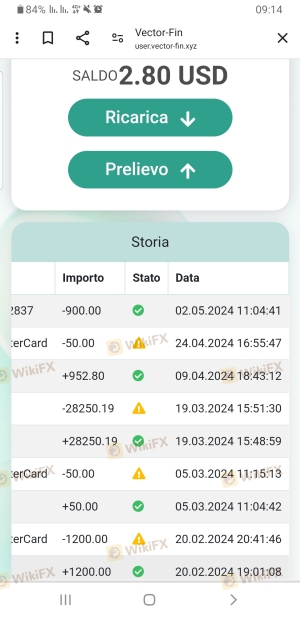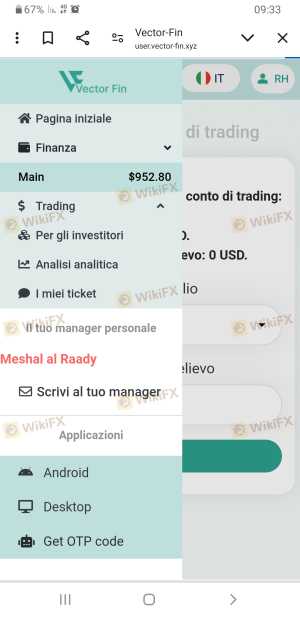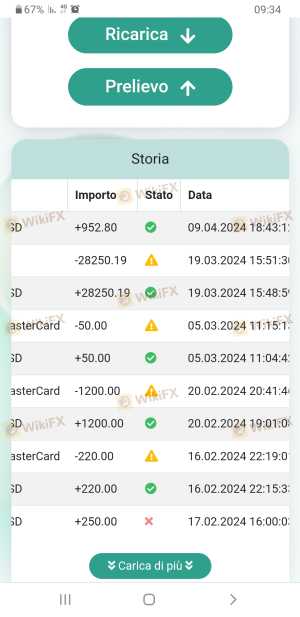Is Vector Fin safe?

Business

License

Is Vector Fin A Scam?
Introduction
Vector Fin is a relatively new player in the forex market, claiming to offer a wide range of trading services across various financial instruments. However, as with any trading platform, it is crucial for traders to evaluate the legitimacy and safety of the broker before committing their funds. The forex market is rife with scams, and unregulated brokers can pose significant risks to investors, including the potential loss of funds. This article aims to provide a comprehensive analysis of Vector Fin, examining its regulatory status, company background, trading conditions, customer safety, user experiences, platform performance, and overall risk profile. The information presented is drawn from various credible sources, including regulatory bodies, user reviews, and financial analysis platforms.
Regulation and Legitimacy
The regulatory status of a trading platform is one of the most critical factors to consider when assessing its legitimacy. Vector Fin operates without a valid license from any major regulatory authority, raising significant red flags about its operations.
| Regulatory Authority | License Number | Regulatory Region | Verification Status |
|---|---|---|---|
| N/A | N/A | N/A | Unregulated |
The absence of regulation means that Vector Fin is not subject to the oversight of any financial authority, which typically ensures that brokers adhere to specific standards of conduct and provide adequate protection for client funds. Regulatory bodies play a vital role in safeguarding investors by enforcing rules regarding fund segregation, negative balance protection, and transparent business practices. The lack of such oversight at Vector Fin indicates that clients may not have recourse in the event of disputes or financial misconduct.
Moreover, multiple financial authorities, including the Federal Financial Supervisory Authority (BaFin) in Germany, have issued warnings about Vector Fin, categorizing it as an unauthorized entity. This further underscores the broker's questionable legitimacy and the potential risks associated with trading through their platform.
Company Background Investigation
Vector Fin was established in 2023, making it a relatively new entrant in the forex brokerage space. The company's claimed headquarters is located in Auckland, New Zealand; however, this information has not been verified by any regulatory body, which raises concerns about its authenticity.
The ownership structure of Vector Fin remains opaque, as there is no publicly available information regarding its founders or management team. This lack of transparency is concerning, as reputable brokers typically provide detailed information about their leadership and corporate governance.
Furthermore, the company's website provides minimal information about its operational history, which is another indicator of potential issues. A well-established broker generally has a track record of compliance and customer service, which is absent in the case of Vector Fin. The overall lack of transparency and verifiable information contributes to doubts about the broker's reliability.
Trading Conditions Analysis
Understanding the trading conditions offered by a broker is essential for traders looking to maximize their investment potential. Vector Fin claims to provide competitive trading conditions, including high leverage ratios and various account types. However, the absence of regulatory oversight raises questions about the validity of these claims.
The following table summarizes the core trading costs associated with Vector Fin:
| Cost Type | Vector Fin | Industry Average |
|---|---|---|
| Major Currency Pair Spread | 1.6 pips | 1.0 - 1.5 pips |
| Commission Model | $0 | $5 - $10 |
| Overnight Interest Range | Not Specified | Typically 2-3% |
While the spread for major currency pairs appears competitive, it is essential to note that many regulated brokers offer lower spreads and more transparent commission structures. Additionally, the lack of clarity regarding overnight interest rates and other potential fees is troubling. Traders should be cautious of hidden costs that could erode their profits.
Moreover, the high leverage of 1:500 may seem attractive but carries significant risk, especially for inexperienced traders. High leverage can amplify losses as well as gains, which may lead to substantial financial distress.
Customer Funds Safety
Client fund safety is paramount in the forex trading environment. Vector Fin has been criticized for its lack of protective measures, which are typically enforced by regulatory bodies.
The broker does not segregate client funds, meaning that investor capital may not be kept in separate accounts, which is a standard practice among regulated brokers to protect client funds in the event of bankruptcy. Additionally, Vector Fin does not provide any negative balance protection, which could leave traders liable for losses exceeding their account balance.
Historically, there have been no reported incidents of fund security breaches directly linked to Vector Fin; however, the absence of regulatory oversight and transparent operational practices leaves clients vulnerable to potential financial misconduct or mismanagement of funds.
Customer Experience and Complaints
Customer feedback is an invaluable resource for assessing a broker's reliability and service quality. Reviews of Vector Fin reveal a troubling pattern of complaints regarding withdrawal issues and lack of customer support.
| Complaint Type | Severity Level | Company Response |
|---|---|---|
| Withdrawal Delays | High | Poor |
| Lack of Support | Medium | Poor |
| Misleading Promotions | High | Poor |
Common complaints include difficulties in withdrawing funds, with many users reporting excessive delays and unresponsive customer service. In some cases, users have alleged that the broker imposes unreasonable conditions for withdrawals, such as unexpected fees or minimum withdrawal limits.
One notable case involved a user who reported being unable to withdraw their funds for several months and received no satisfactory response from customer support. This pattern of behavior is concerning and suggests a lack of commitment to customer service and ethical business practices.
Platform and Execution
The performance of a trading platform is crucial for a trader's success. Vector Fin utilizes the Evotrade platform, which has received mixed reviews from users.
Traders have reported issues with platform stability, including slow execution times and occasional disconnections during trades. Additionally, there are concerns about slippage and order rejections, which can significantly impact trading outcomes.
The overall user experience on the platform is reported to be subpar, with many users expressing dissatisfaction with the interface and functionality. Such performance issues can be detrimental, particularly for traders who rely on timely execution to capitalize on market movements.
Risk Assessment
Engaging with Vector Fin presents several risks that potential traders should consider carefully.
| Risk Category | Risk Level (Low/Medium/High) | Brief Description |
|---|---|---|
| Regulatory Risk | High | No regulatory oversight, increasing potential for fraud. |
| Fund Safety Risk | High | Lack of fund segregation and negative balance protection. |
| Customer Service Risk | Medium | Poor response to customer complaints and withdrawal issues. |
| Platform Risk | Medium | Stability issues and potential for order execution problems. |
To mitigate these risks, traders should conduct thorough research before investing and consider using regulated brokers with established reputations. It is also advisable to start with a demo account to familiarize oneself with the platform without risking real money.
Conclusion and Recommendations
In conclusion, the evidence suggests that Vector Fin raises significant concerns regarding its legitimacy and safety as a trading platform. The absence of regulatory oversight, coupled with a lack of transparency and numerous customer complaints, indicates that potential traders should exercise extreme caution.
For those looking to engage in forex trading, it is highly recommended to consider alternative brokers that are regulated and have a proven track record of customer satisfaction and fund safety. Some reliable alternatives include brokers regulated by the FCA, ASIC, or CySEC, which offer robust investor protection and transparent trading conditions.
Ultimately, while the allure of high leverage and competitive spreads may be tempting, the risks associated with trading through an unregulated broker like Vector Fin far outweigh the potential benefits.
Is Vector Fin a scam, or is it legit?
The latest exposure and evaluation content of Vector Fin brokers.




Vector Fin Similar Brokers Safe
Whether it is a legitimate broker to see if the market is regulated; start investing in Forex App whether it is safe or a scam, check whether there is a license.
Vector Fin latest industry rating score is 1.38, the higher the score the safer it is out of 10, the more regulatory licenses the more legitimate it is. 1.38 If the score is too low, there is a risk of being scammed, please pay attention to the choice to avoid.